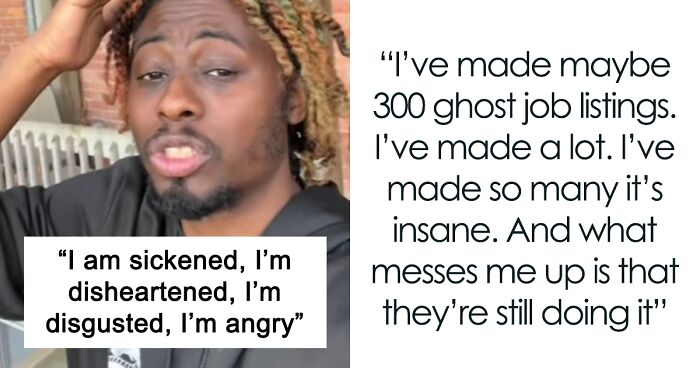
Guy Gets Fired For Refusing To Post “Ghost Jobs,” Goes Viral Exposing The Toxic Trend
Interview With ExpertJob hunting can feel like an uphill battle, especially with so many candidates striving to catch an employer’s eye in a competitive market. Unfortunately, it’s only getting harder with a new obstacle standing in the way—‘ghost jobs.’ These fake listings, posted by companies, mislead countless hopeful applicants, making them chase opportunities that don’t actually exist.
Digital creator and hiring manager Ceros Whaley recently took to TikTok to shed light on this issue. Keep scrolling to hear his thoughts, and don’t miss our chat with career coaches Renata Junkova and Hannah Salton, who explain why businesses create deceptive ads.
According to this hiring manager, the job you applied for might not exist
Image credits: Austin Distel / unsplash (not the actual photo)
“I got fired from my second job ’cause I wouldn’t post a ghost job. So, let me explain what I do for my second job, what I did for my second job. I was a hiring manager. I usually just post job listings sometimes on Indeed or other job listing websites for my company. I’m not gonna explain what company that is ’cause I can’t do that, but I am gonna talk about what I can talk about ’cause I read through my NDA.
I used to post ghost jobs, which are fake jobs to encourage our current employees to work harder. These jobs will be fake jobs, so you could apply for the listing but not actually get hired. They’re called ghost jobs. You’re probably wondering, ‘I apply for all these places, why am I not getting callbacks?’
You might have applied for a ghost job, which isn’t a real job, it’s just put there to show that we’re looking for new hires at higher rates to get our current employees to work harder, as an incentive to make them work hard as opposed to increasing the base pay or the base rate. And I’ve made maybe 300 ghost job listings. I’ve made a lot. I’ve made so many it’s insane. And what messes me up is that they’re still doing it.”
Image credits: ceroswhaley
“I got into a little bit of a scuffle, a fracas one might say, with my previous hire manager. My hire manager said, ‘Hey, you stopped posting ghost jobs. Look, what’s going on buddy? It’s really working. It’s helping our team morale.’
I said, ‘Listen, I don’t feel good about doing this.’ Might be the first time I’ve ever said that. Usually, I have like no morals, no ethics about anything. I just didn’t feel good at all about doing it, despite the fact that I was getting a massive bag from it, and he said, ‘Well, we need somebody to do it, and you’re the best we’ve got.’
I’m not gonna continue to post ghost job listings so our employees can act like they are scared to lose their jobs. That ruins, destroys their mental health deeply. And he said, ‘That’s HR’s job, not ours.’ So I’m talking to him and I’m arguing, and at this point, he’s shouting. I’m calm.
So I’m thinking I can take it to HR, and he says, ‘You know we’re probably gonna have to talk about this later, but you should clock out for the day.’ I said, ‘I don’t wanna clock out for today, because we’re not done talking about the specific issue.’ This is insane, this is psychotic. So I go cool off. I talk to my friends on Discord, we’re cooling off, we’re talking about it.”
Image credits: Resume Genius / unsplash (not the actual photo)
“Then one of my friends does the same job as I do. He also posts ghost jobs. And it’s disgusting. It’s not just my company, it is every company I’m seeing doing this: it’s Walmart doing this, it’s Amazon doing this, I’m not gonna disclose my company, but it’s Best Buy doing this.
They’re posting these fake job listings to trick you into thinking ‘Oh well, they’re hiring a bunch of other things.’ Or because just in case you’re looking to move to a new job or talking about needing a pay raise. And they’ll post a new job at a higher rate. Say you got hired at $17 an hour, they’ll post a ghost job at $22 an hour. And if you try to apply for that, they’ll clock you for that, and they’ll know it’s you ’cause they got your Social Security number.
It is a disgusting business practice ’cause as soon as you apply to get a higher position or anything like that, they’ll talk to you about it and they’ll ask you, ‘Why do you want a higher position? Do you want more pay? Are you dedicated to the company?’ They’ll give you a performance review, they’ll check everything about you just to see.”
Image credits: ceroswhaley
“I recommend, this is my honest opinion, this is my honest recommendation, doing the bare minimum at jobs. I mean, bare minimum. Just coast by, doing the bare minimum at jobs. Don’t try to do anything extra or crazy, just coast by, doing the bare minimum at jobs. I’m so serious.
Because I didn’t know there was so much of it. I thought it was just my job doing this. I thought we were like the monopoly on doing this, that’s what I thought. But I’m applying to other jobs, I’m applying to other places, and I’m noticing the ghost jobs. I’m noticing that there are many of them. There are so many ghosts out there that are just fake. They’re just fake jobs.
I am sickened, I’m disheartened, I’m disgusted, I’m angry ’cause I don’t have my second job anymore, by the way. It was a small job, I worked 20 hours a week just doing the analytics and the hiring for our company, that’s all I did. I still work at Amazon, but man, I’m just sickened. Amazon doesn’t care about what I post, by the way. They’re fine with me doing whatever. Amazon doesn’t check anything I do, they don’t care about me at all, but man, this is stupid, this is weird. Look up ghost jobs, just look them up.”
You can watch the full video here
@ceroswhaley#fyp#storytime#job#foryou#viral♬ original sound – CerosWhaley
Over a third of job advertisements are fake
Ceros Whaley’s experience might seem surprising, but it reflects a widespread practice many people aren’t aware of. A recent survey by MyPerfectResume, which gathered insights from over 700 U.S. recruiters, revealed a startling statistic—81% admitted to posting ghost job ads. This means more than a third of all job listings online, roughly 36%, aren’t for actual vacancies.
Bored Panda reached out to industry experts Renata Junkova and Hannah Salton to learn more about why this happens and how people can protect themselves from these misleading listings.
One reason companies use ghost jobs is to test the market and gauge the available talent. “This is common among small companies and startups that are uncertain about their direction,” says Renata Junkova, career and executive coach, founder of Runway Excellence, and creator of the Career Pulse Newsletter.
In other words, they’re putting out feelers for potential openings. As career coach Hannah Salton, author of Graduate Careers Uncovered, explains, “A company may not have a specific job available at the moment, but they anticipate needing to hire in the future. Posting a job ad allows them to see what the candidate pool looks like.” This also helps them assess whether it’s worthwhile to hire someone new or if existing staff can handle additional responsibilities, Junkova notes.
Alternatively, fake listings serve as a means for companies to conduct market research. “They might be testing which job ads are most effective, or they could be trying to boost their brand’s visibility,” says Salton.
In some cases, organizations go through with interviews for nonexistent jobs just to gather insights from candidates who are experts in the field. “Especially in startups, they might assign projects during the interview process to benefit from the candidates’ ideas and strategies, which can be unethical,” Junkova observes.
In industries with high turnover, like retail or hospitality, businesses frequently keep job ads running to ensure they have a steady stream of applicants ready for quick hiring. Junkova points out that even when there’s a preferred candidate in mind—such as an internal employee or a referral—these organizations still post the ad publicly to comply with company policy and see if any exceptional candidates might come forward.
An even more concerning scheme is posting ghost jobs to collect personal data for fraudulent purposes. “People might create fake ads to capture applicants’ personal details for scams or to sell their data,” says Salton. If spam emails have been flooding your inbox since you started applying for jobs, this could be the culprit.
Overall, these tactics can really throw job seekers off and waste their time, so it’s essential to be aware of them, according to Junkova.
Image credits: Vlada Karpovich / pexels (not the actual photo)
How to spot ghost job listings and land a real offer
To steer clear of ghost job ads, Junkova recommends looking out for these red flags:
- Posting Date: If a job ad has been up for weeks or even months, it could mean the company isn’t serious about hiring or is just collecting resumes for future use.
- Vague Job Description: Be cautious if the ad doesn’t clearly outline the role’s main duties, responsibilities, or the company culture. This could indicate that the job doesn’t actually exist.
- Company Reviews: Check the company’s reviews on sites like Glassdoor to see what other candidates have said about their interview experiences. Negative reviews could be a warning sign.
Of course, with how competitive the job market can be, it’s easy to feel tempted to apply to every listing you find just to improve your chances. However, both Salton and Junkova argue that mass applications aren’t as valuable as forming genuine human connections.
“As a career coach, I generally advise people to favor networking over applying to job postings—fake or not,” says Salton. “Building relationships with individuals who work at your desired company is generally more effective than submitting a high volume of generic applications.”
It may take extra effort, but it can set you apart in the long run, particularly with the help of social media networks. “Don’t be afraid to reach out directly to decision-makers on LinkedIn,” says Junkova. “It might feel awkward at first, and you may need to step outside your comfort zone, but this direct approach can be surprisingly rewarding.”
Your strength as a candidate will increase in the eyes of companies if you take the time to research and send a personalized, concise message, including a clear call to action, like suggesting a quick chat. Employers notice when someone makes the first move with genuine enthusiasm and intent.
“Remember, companies value bold candidates who confidently pursue what they want,” Junkova adds.
For more insights, follow Renata Junkova on Instagram and connect with Hannah Salton on LinkedIn.
Image credits: Vlada Karpovich / pexels (not the actual photo)
People in the comments acknowledged how frustrating it is to deal with misleading ads, both as employees and job seekers
Whaley also posted a follow-up video with additional tips on how to avoid falling for ghost jobs
@ceroswhaley Replying to @Aυƚιʂƚιƈαʅʅყ.Dɾιʋҽɳ 🥀꧁༺༻꧂🖤 #fyp#jobs#manager#reply#replyingtocomments#viral♬ original sound – CerosWhaley
Poll Question
Thanks! Check out the results:
I bet there are companies that post up jobs to make it "look" like they are doing something about short staffing, when they may not actually intend to (cough - cough... hospitals... cough - cough)...
Yes! There is a hospital system here (several area hospitals under the same company) and they always have tons of listings. When I graduated with my phlebotomy cert, I applied at every opening every time a new one popped up. I never even got an interview. In a year and a half I've applied so many times I've lost count. My daughter applied to several admin positions she is qualified for. There were 15 different openings across hospitals so she applied to each one. You can make an account to track the status of your applications. Every time it says reviewed but they decided not to move forward. Not a single call back on 15 applications? And I applied way more than that, and nothing. And they regularly post new listings. I'm always joking that their turnover must be through the roof. The listings have to be fake.
Load More Replies...Not sure about the "to make people work harder" part. But I do know of some companies that post fake openings simply because, even if they're not hiring, HR always wants to have potential candidates in the queue in case they start.
Well, now I know why I only got 3 interviews out of the 4 to 5 dozen applications I sent in. This should be a crime. Either fraud or false advertising.
They also rely on an automated system to filter out CVs. It’s funny they rely on it as the damn thing can’t actually read a CV which is why you have to put everything into an online form, after uploading your CV.
Load More Replies...I bet there are companies that post up jobs to make it "look" like they are doing something about short staffing, when they may not actually intend to (cough - cough... hospitals... cough - cough)...
Yes! There is a hospital system here (several area hospitals under the same company) and they always have tons of listings. When I graduated with my phlebotomy cert, I applied at every opening every time a new one popped up. I never even got an interview. In a year and a half I've applied so many times I've lost count. My daughter applied to several admin positions she is qualified for. There were 15 different openings across hospitals so she applied to each one. You can make an account to track the status of your applications. Every time it says reviewed but they decided not to move forward. Not a single call back on 15 applications? And I applied way more than that, and nothing. And they regularly post new listings. I'm always joking that their turnover must be through the roof. The listings have to be fake.
Load More Replies...Not sure about the "to make people work harder" part. But I do know of some companies that post fake openings simply because, even if they're not hiring, HR always wants to have potential candidates in the queue in case they start.
Well, now I know why I only got 3 interviews out of the 4 to 5 dozen applications I sent in. This should be a crime. Either fraud or false advertising.
They also rely on an automated system to filter out CVs. It’s funny they rely on it as the damn thing can’t actually read a CV which is why you have to put everything into an online form, after uploading your CV.
Load More Replies...
 Dark Mode
Dark Mode 

 No fees, cancel anytime
No fees, cancel anytime 







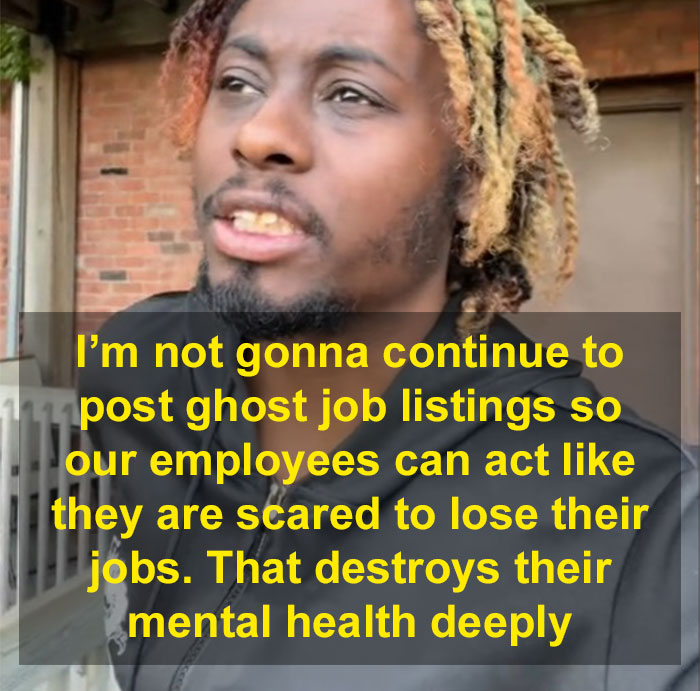

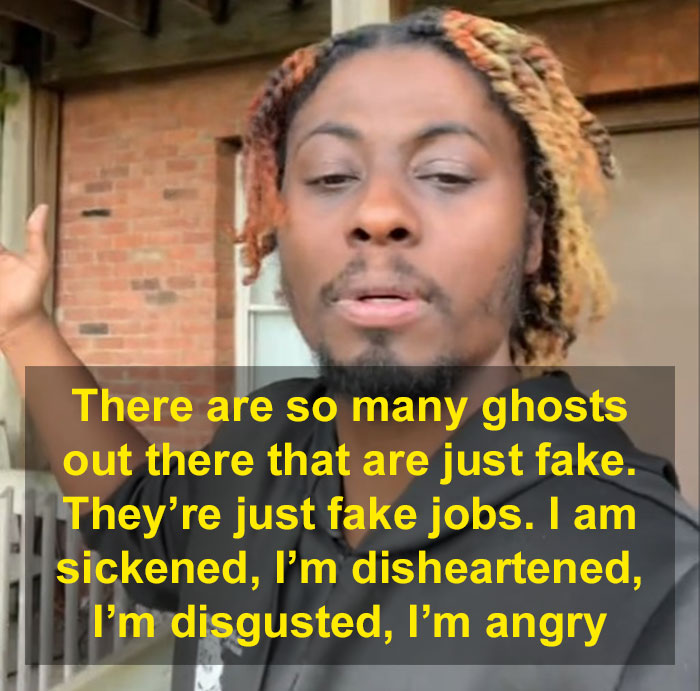


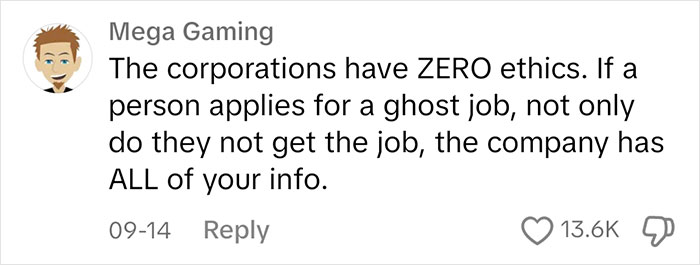


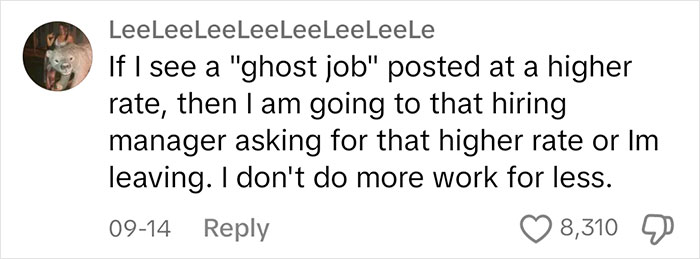
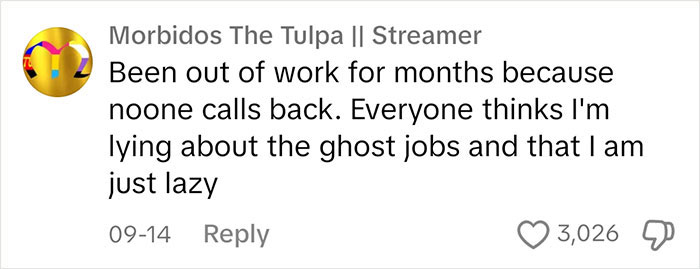
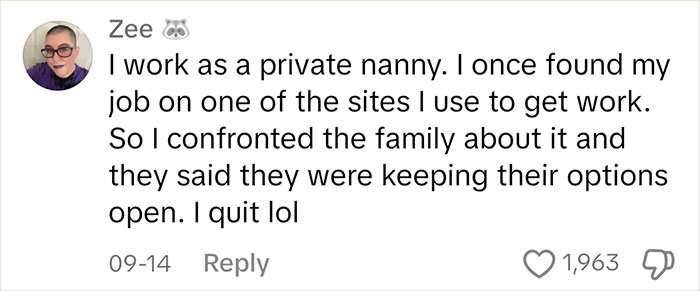
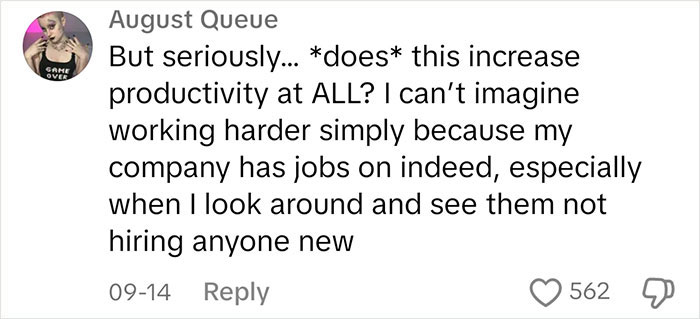





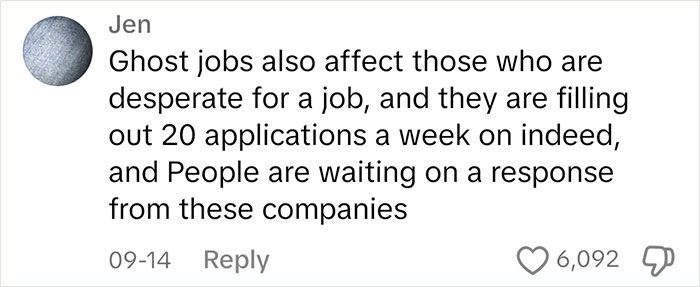

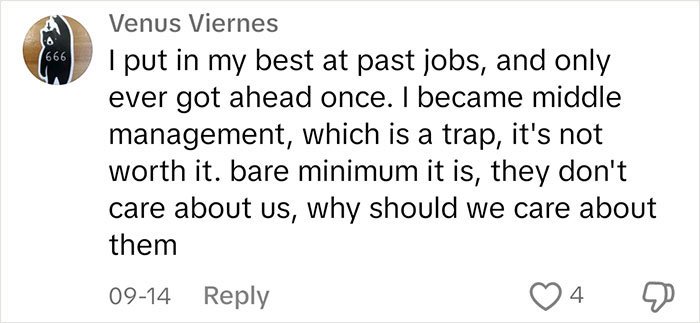
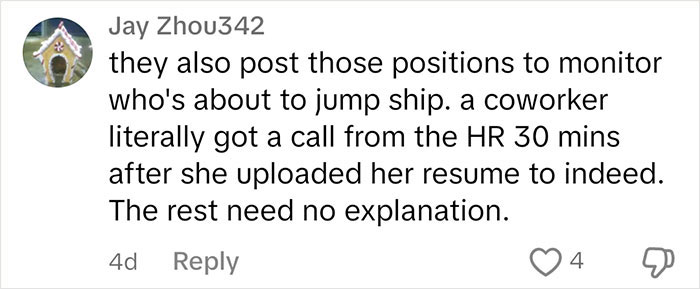
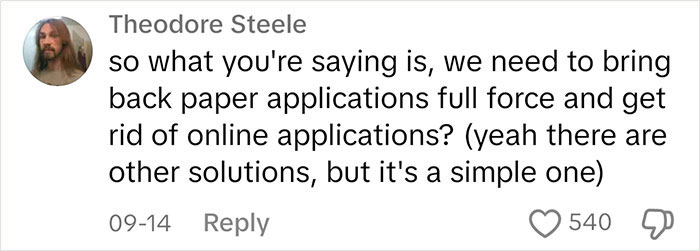

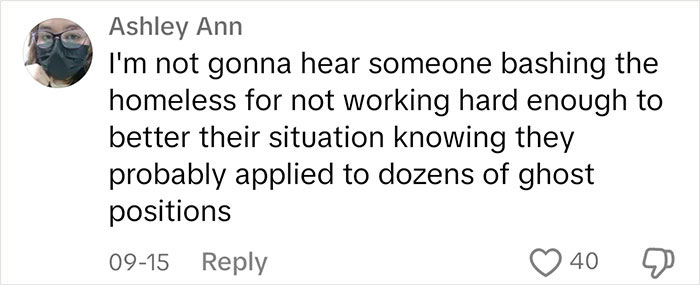
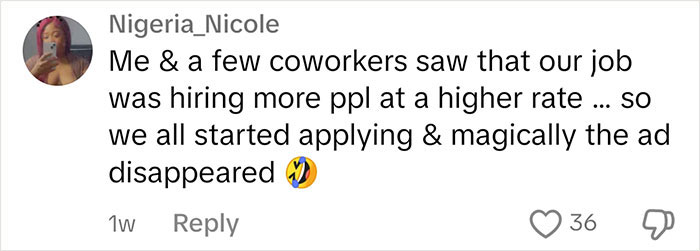
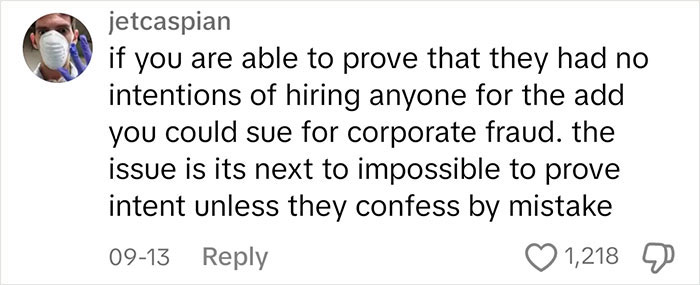












































33
22